Issue, No.12 (December 2019)
Positional Deprivation and Support for Radical Parties
This article draws from LIS Working Paper No. 733. “Radical Right Populism and the Role of Positional Deprivation and Inequality”, that is the winner of the 2019 Aldi Award.
Introduction
The rise of radical populist parties counts as one of the more important developments in recent European political economics. Such radicalism has long simmered in Europe’s post-War electoral politics, but in recent years the gains for radical parties and programs have broadened and deepened. The broadening has touched countries that long resisted the radical tide, such as Germany and its radical right Alternative for Germany. The broadening goes further, as many mainstream parties of the center right and left have in recent years adopted some of the positions and rhetoric of radical parties (Van Spanje, 2010; Abou-Chadi, 2016). The deepening, meanwhile, involves the sustained electoral gains achieved by parties of both the radical right and left. On the right, this includes the Danish Freedom (DF) Party, the Dutch Party of Freedom (PVV), and Italy’s League [formerly known as the Lega Nord (LN)]. On the left, radical left parties like Greece’s Syriza and Spain’s Podemos have become as influential as, or fully overshadow, both mainstream and radical right-wing parties. There are major differences between and among radical parties on both sides, such as on issues of migration and redistribution, but all radical parties share a focus on economic and political nationalism, Euroscepticism, and anti-system/anti-elite positioning (Hooghe et al., 2002; March and Mudde, 2005; Hopkin, 2019). The broadening and deepening of such radicalism poses major challenges to the economic and political policies that have long defined the Western democratic order, and may have unleashed potentially deeper challenges to the integrity of democracy itself.
Much existing research links support for radical parties to individual-level economic variables such as income and unemployment, or to macro-level economic variables such GDP growth, income inequality, or trade shocks. These factors do not, however, capture directly what many detailed qualitative-inductive studies of an anti-system backlash have identified as important: resentments at being increasingly discarded relative to others in the polity, particularly relative to those “unfairly” privileged (e.g. Hothschild 2016; Cramer 2016; Gest 2016). In Burgoon et. al. (2019) we try to capture this combination of dynamic (over time) and positional (relative to others) economic well-being by introducing the concept of positional deprivation, which we define as the degree to which an individual has seen his/her income decline/increase relative to others in the same society. Hence, while the existing literature has focused on the effect of inequality at the level of income we focus on inequality in the growth of income across different strata of a society’s income distribution
Combining data from the Luxembourg Income Study (LIS) and the European Social Survey (ESS) for 20 European democracies over the 2002 to 2014 period we find that individuals experiencing lower income gains, or greater losses, than the gains experienced by others in the income spectrum (e.g. the average, median, richest, poorest) are significantly more likely to support or vote for radical parties (i.e. net of the level of income and inequality). We find that these effects are economically substantial and are larger, for example, than subjective economic well-being, gender, and urban/rural residency, though still smaller than education.
Importantly, we also find that whether an individual supports a radical right- or a radical left party depends in turn on the type of positional deprivation he/she has experienced (i.e. net of any pre-existing left-right ideological positioning): positional deprivation relative to the wealthiest groups in society tends to spur support for radical left-wing parties, while positional deprivation relative to the poorest groups in society tends to spur support for radical right-wing parties. The rest of this article describes our study in more detail.
Data
Testing the effect of positional deprivation on radical voting is challenging as individual-level panel data on income and political preferences in country-years during which radical parties are present is not sufficiently available. To get around this data problem we therefore combine cross-sectional data on party preferences from the European Social Survey (ESS) with data on country-decile level income dynamics from the Luxembourg Income Study (LIS).
Using the ESS data we measure our main left-hand side variable as a nominal variable with 4 categories: (1) respondent feels currently closest to a non-radical/mainstream party; (2) respondent feels currently closest to a radical left-wing party; (3) respondent feels currently closest to a radical right-wing party; and (4) respondent feels currently closest to no party. To classify parties as mainstream, radical right-wing, or radical left-wing we rely on the relatively well-established classification practices in the existing political science literature (see table 1). In the paper we show that the results are robust for a wide range of recoding of borderline cases.
Table 1. Party classification
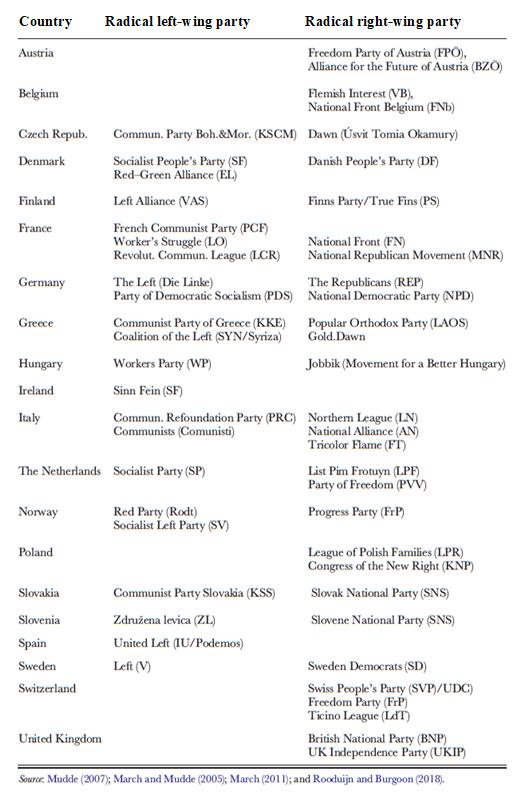
Given that the ESS only measures a respondents’ current income, and only measures this current income on the decile (rather than interval/ratio) level, we use LIS data to measure changes in real household income across deciles in a given country-year and match this data to the ESS. Our operationalization of the concept of positional deprivation therefore consists of the increase/decrease of the mean income growth for all deciles (or a particular decile) in a country’s income distribution minus the growth of a respondents’ own income decile during the previous five years. Figure 1 illustrates the type of data structure that underlies this approach. To illustrate, over the 1995 to 2005 time period respondents in the 5th decile in Germany would have experienced most positional deprivation according to our coding, because while income in Germany’s 5th decile only grew 0.3% over this time period, income grew by 3.4% across the entire income distribution.
Figure 1. Growth in disposable income by decile, selected countries 1995–2005
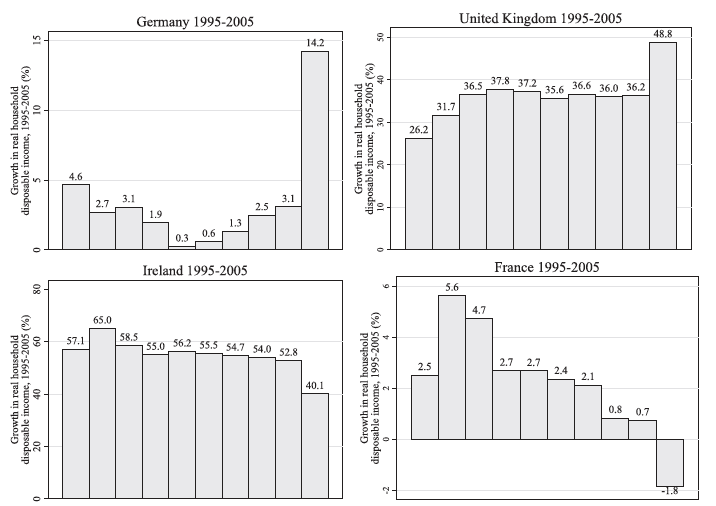
Source: Luxembourg Income Study (LIS) Database.
Empirical Strategy
To assess the relationship between positional deprivation and support for radical parties we estimate multinomial logit models with country fixed effects, time fixed effects, and a wide range of individual-level control variables. Identification relies on three key assumptions.
First, the Independence of Irrelevant Alternatives (IIA) assumption, which is presupposed by any multinomial model. In our case, the IIA assumption entails that, conditional on the covariates, the odds of any individual respondent choosing any of the four alternatives incorporated in our dependent variable does not depend upon whether a radical right-wing and/or left-wing party is present or absent in a particular country-year. Hausman and McFadden (1984) suggest that this assumption is likely to hold in our case. We also find substantively similar results when running individual logit/probit models on all outcomes separately, and this is an approach that does not rely on the IIA assumption.
Second, our estimates could be biased due to the fact that we are forced to proxy individual-level income dynamics with the income dynamic of the respondents’ decile group, which we assume (s)he was in during the previous five-year period (based on the decile the ESS has coded him/her in at the end of the five-year period). This means that our measures of positional deprivation introduce significant measurement error because: (i) there may be significant within-decile differences in income dynamics relevant to political preferences which we can, however, average out by design, and (ii) we may miscode individuals that have moved into another decile over the previous five-year period. To the extent that this measurement error is not random and would bias regression coefficients downwards due to attenuation bias, it could affect the validity of our estimates. We address this issue by a robustness check whereby we include the dynamics of the decile above and below (separately) together with the income decile that a respondent is coded in. We find the results unchanged. This robustness check is likely to take care of this problem as respondents are unlikely to move up or down more than one decile in five years. To adjust for the autocorrelation generated by (i), we cluster the standard errors on the country-decile level in all our estimates.
Lastly, as is typical for observational data, our multinomial logit estimates may be biased due to confounding (i.e. unobserved variables that cause both positional deprivation and party support). To alleviate this concern we add country and time fixed effects, which control by design for all omitted variables that vary across countries and for all omitted variables that affect all respondents at the same time (i.e. common shocks). In addition to this we parametrically control for: subjective economic well-being, education, age, gender, nationality, religiosity, urban/rural residency, and left-right (ideological) self-placement. Nonetheless, we would like to make clear that we consider our results to reflect robust correlations rather than causation.
Results
Figures 2, 3, and 4 summarize our results. They report predicted probabilities of ESS respondents indicating that they feel closest to a radical right-wing or radical left-wing party (the vertical axis) at different levels of positional deprivation (the horizontal axis), holding all covariates at their means or medians. The dashed lines indicate 95% confidence intervals.
Figure 2 shows the effect of mean positional deprivation, defined as a country’s average income growth minus the average income growth in the respondents’ own income decile over the past five years. As can be seen the model estimates that seeing one’s own income increase less rapidly, or decrease more steeply, as compared to the country’ average, substantively increases the probability that one supports a radical party. More specifically, an increase in positional deprivation across the entire sample distribution increases the likelihood of supporting a radical right-wing or left-wing party by 2 and 4.2%, respectively. These effects are economically substantial as the unconditional mean of supporting any radical party is only 3% in this sample.
Figure 2. General positional deprivation and support for radical left-wing and right-wing parties
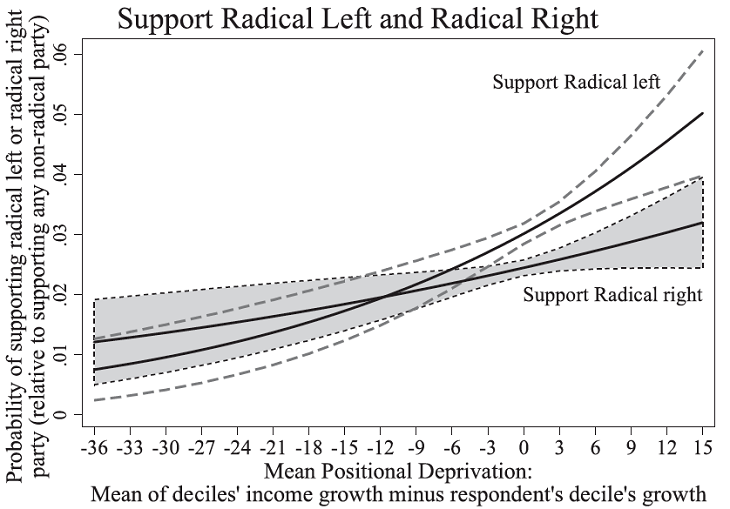
Figures 3 and 4 show that the effect of positional deprivation varies with regard to the reference group in ways that one may expect given the platforms of most radical right-wing and left-wing parties.
In figure 3 we see that when individuals see their own income increase less rapidly, or decrease more steeply, as compared to the richest 10% of society they are more likely to support a radical left-wing party, but not more likely to support a radical right-wing party (note again that an individual’s pre-existing left-right ideological positioning is presumed to be constant). This is in line with the platforms of many radical left-wing parties which often portray the rich as having rigged the game in their favor, undeservingly getting richer and richer at the expense of the rest of society.
Figure 3. Upper-register positional deprivation and support for radical left-wing and right-wing parties
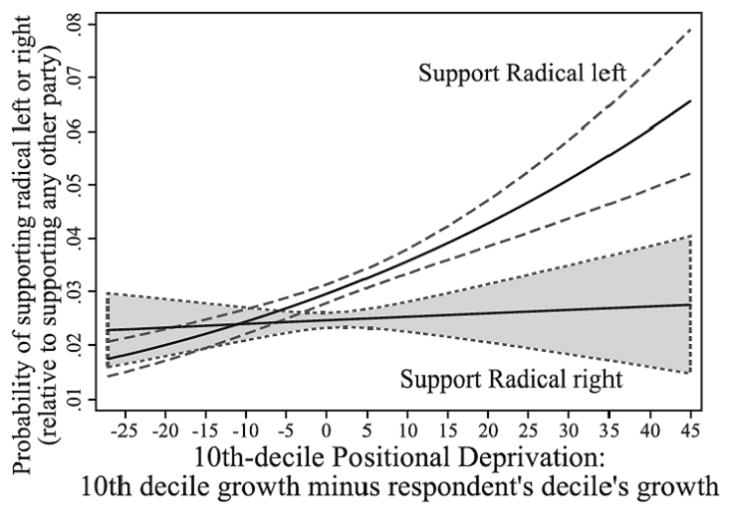
Figure 4, in contrast, shows that positional deprivation relative to the poorest 10% of the income distribution has the opposite effect: people who have seen less income growth as compared to the poorest decile are significantly more likely to support a radical right-wing party, but not significantly more likely to support a radical left-wing party. This is in line with many radical right-wing party platforms which focus on the poor, particularly poor migrants, that in their eyes are disproportionately advantaged by welfare state arrangements “meant” for natives.
Figure 4. Lower-register positional deprivation and support for radical left-wing and right-wing parties
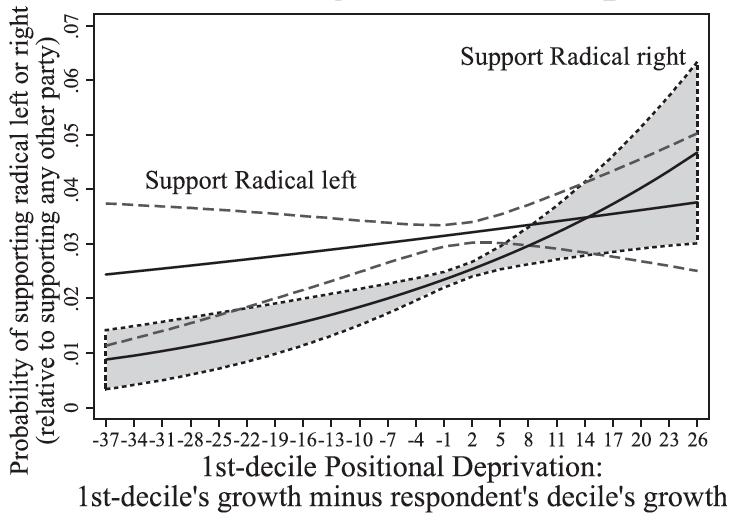
Policy Implications
Our study suggests that radical voters are not only motivated by their level of economic well-being, or how their standard of living has developed over time, but also care deeply about how their economic situation has changed over time relative to other groups in society. This has important policy implications as existing socio-economic policy generally does not take this relational and dynamic aspect of economic well-being into account. Future policy interventions may do so by employing mean tests that focus not only on the level of wealth/income but also the over-time experience of different societal groups. Considering this aspect of economic well-being is likely to be important for countering political radicalism and polarization.
References
| Burgoon, B, van Noort, S., Rooduijn, M., and Underhill, G.R.D. (2019). “Positional Deprivation and Support for Radical Right and Radical Left Parties” Economic Policy, 34, 49-93. |
| Hochschild, A.R. (2016). Strangers in Their Own Land: Anger and Mourning on the American Right. The New Press. |
| Cramer, K.J. (2016). The Politics of Resentment: Rural Consciousness in Wisconsin and the Rise of Scott Walker. University of Chicago Press. |
| Gest, J. (2016). The New Minority: White Working Class Politics in an Age of Immigration and Inequality. Oxford University Press. |
| Hooghe, L., G. Marks, and C.J. Wilson (2002). ‘Does left/right structure party positions on European integration?’, Comparative Political Studies, 35, 965–89. |
| Hopkin, J. (2019).Anti-system Politics: The Crisis of Market Liberalism in Rich Democracies, Oxford University Press. |
| March, L. and C. Mudde (2005). ‘What’s left of the radical left? The European radical left after 1989: decline and mutation’, Comparative European Politics, 3, 23–49. |
